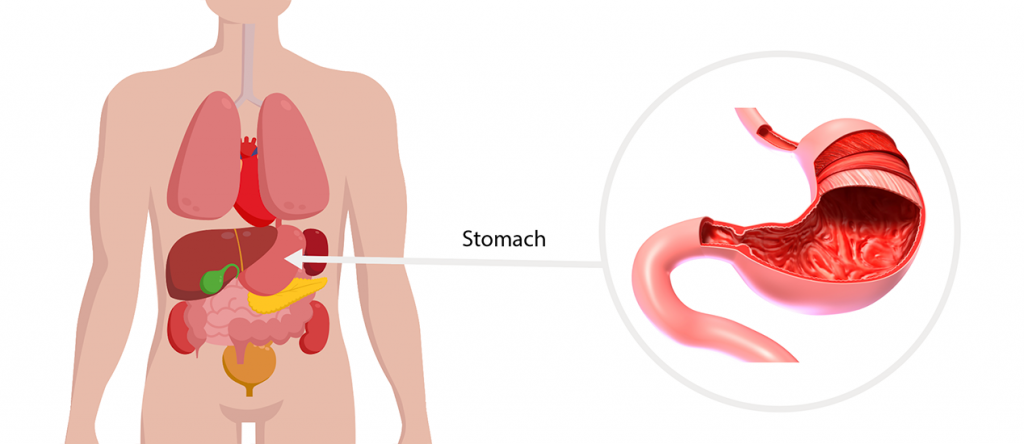The stomach is an organ in the upper part of the abdomen. It is connected to the oesophagus and ends in the duodenum. It helps digest food and absorbs many important nutrients before the food moves to the intestines. There are different layers of tissue in the stomach wall that help in the digestion and absorption process and it also releases many important hormones.

STOMACH CANCER/GASTRIC CANCER
Where is the stomach?
What is stomach cancer?
This is when cells in the wall of the stomach undergo cancerous change. Malignant cancer cells are abnormal cells that have not only lost control over how they grow, but can also spread in the human body. The commonest form of stomach cancer is called ‘gastric adenocarcinoma.’ This originates from the innermost layer of the stomach called the mucosa. There are a number of subtypes of gastric cancer such as diffuse type cancer and linitis plastica.
There are a number of other types of stomach cancer such as gastro-intestinal stromal tumours (GIST), squamous cell carcinomas and neuroendocrine tumours.
Patients can also have early gastric cancer which can sometimes be treated with endoscopic resection and may not need formal surgery of the stomach.
Stomach cancer can spread to the outer layers of the stomach and potentially beyond to the blood stream or lymph nodes. This allows stomach cancer cells to spread into nearby organs such as the pancreas and bowel and other parts of the human body such as the liver or lining of the organs (peritoneum).
How is stomach cancer investigated?
A number of tests are often required and can include
- Blood tests
- CT Scan
- Endoscopy (to look at the cancer from the inside and to take biopsies)
- Endoscopic Ultrasound
- CT-PET / MRI (rarely)
How is stomach cancer treated?
Treatment of gastric cancer is complex and requires extensive investigations and coordination among specialties including radiologists, gastroenterologists, surgeons, and oncologists. Chemotherapy is often a part of the treatment before and/ or after surgery. Some cases of early gastric cancer can also now be treated by non-surgical, endoscopic methods by a gastroenterologist. Surgery often involves either partial or complete removal of the stomach and surrounding lymph nodes for a comprehensive cancer operation. At Harbour Surgery we have extensive experience coordinating cancer care in the public and private sector and we can tailor the treatment to suit individual patients. With good surgical and medical care, many patients with gastric cancer have a good long term outcome.
